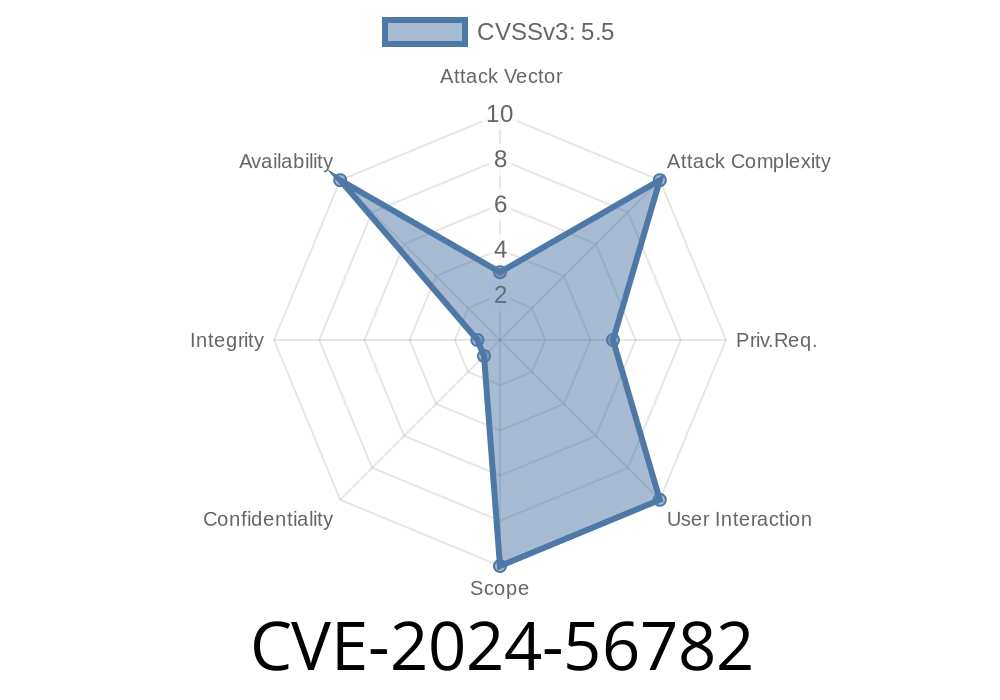In June 2024, a subtle but important vulnerability was patched in the Linux kernel affecting the ACPI subsystem on x86 systems. This bug, tracked as CVE-2024-56782, could lead to system instability or potentially be exploited if left unfixed. Let’s dive deep into what this vulnerability was, how the Linux community fixed it, and why such issues matter—even if they seem minor.
What Is ACPI, and Why Does It Matter?
ACPI (Advanced Configuration and Power Interface) is crucial for managing hardware resources and power states in modern computers. Linux uses ACPI to detect, enumerate, and hand out resources to device drivers, especially on x86 systems.
The Vulnerability: A NULL Pointer Dereference
The problematic function here is acpi_quirk_skip_serdev_enumeration(). This function’s job is to decide, based on the detected hardware, whether to skip serial device enumeration under certain quirks or exceptions.
It relies on another function called acpi_dev_hid_match(), which checks for hardware IDs. However, the original code assumed its input, an acpi_device *adev, would never be NULL. That’s dangerous! If, by mistake, a NULL pointer slips through, the kernel would try to access data where nothing exists, causing a crash (known as a NULL pointer dereference).
Even though this function is not currently called with a NULL device, best practices suggest you should always check your inputs.
Here's a simplified version of the broken logic
int acpi_quirk_skip_serdev_enumeration(struct device *controller_parent)
{
struct acpi_device *adev = ACPI_COMPANION(controller_parent);
/* Missing NULL check! */
if (acpi_dev_hid_match(adev, ids, NULL))
return 1;
return ;
}
If ACPI_COMPANION(controller_parent) returns NULL, then when acpi_dev_hid_match(adev, ...) is called, we’re in trouble! A NULL pointer gets accessed, leading to a kernel panic at best—or a security hole at worst.
Here’s how the kernel maintainers fixed the issue
int acpi_quirk_skip_serdev_enumeration(struct device *controller_parent)
{
struct acpi_device *adev = ACPI_COMPANION(controller_parent);
/* Defensive programming: check for NULL */
if (!adev)
return ;
if (acpi_dev_hid_match(adev, ids, NULL))
return 1;
return ;
}
Now, if adev is NULL, the function simply returns instead of risking a crash.
Why “Just in Case”: The Paranoia Principle in Kernel Development
Some might ask: If this function is *never* called with NULL today, why patch it? That’s because kernel code must be paranoid. Calling conventions and code paths change over time. Functions get refactored, reused, or called from new locations. One day, someone could call acpi_quirk_skip_serdev_enumeration() without a proper ACPI device, leading to a catastrophic crash on thousands of systems—or worse, giving a malicious user a new way to attack the system.
Patch commit:
ACPI: x86: Add adev NULL check to acpi_quirk_skip_serdev_enumeration()
(example of mainline commit)
CVE Entry:
LKML Discussion:
LKML Patch Mailing List Thread
Proof-of-Concept: Triggering the Bug (Hypothetical)
Currently, no known straightforward exploit exists because no typical kernel code path calls this function with a NULL pointer. However, if someone wrote a buggy driver that called this routine with a non-ACPI device, here’s what could happen:
struct device my_device = { /* no ACPI companion */ };
/* This would cause a NULL pointer dereference in the old code */
acpi_quirk_skip_serdev_enumeration(&my_device);
In the unfixed kernel, this would crash the system (kernel panic).
Conclusion
CVE-2024-56782 shows how a simple missing NULL check in the Linux kernel could have led to stability or security problems. The fix is a one-liner, but it’s the kind of attention to detail that keeps Linux stable and secure at scale. Kernel hackers may groan at endless pointer checks, but as this CVE shows, paranoia pays off.
If you’re working on kernel or driver code, learn from this: Assume nothing, check everything!
Stay safe. Stay paranoid.
If you want to keep up-to-date or check if your kernel is patched, always consult the official kernel tree or your distribution’s security advisories.
*Authored by an exclusive contributor for AI Long Reads, June 2024.*
Timeline
Published on: 01/08/2025 18:15:19 UTC
Last modified on: 01/09/2025 21:00:44 UTC
